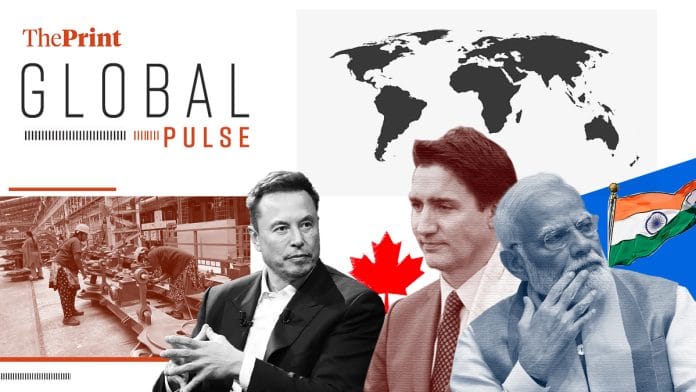New Delhi: The anglosphere has closed ranks around Canada as the ongoing India-Canada diplomatic saga continues, with the governments of US, UK, Australia and New Zealand backing up their Five Eyes ally Canada.
Politico reports that the backing up is happening “albeit carefully”. It quotes the US state department as saying India has “chosen an alternative path”, and the UK’s foreign office statement as saying India’s “cooperation with Canada’s legal process is the right next step”. Australia’s department of foreign affairs said Canberra had voiced its “concerns” to India, and maintained its position of respect for Canada’s judicial process. New Zealand’s foreign minister said the allegations, if proven, would be “very concerning”—but the country would refrain from commenting on ongoing criminal investigations.
Canadian Prime Minister Justin Trudeau gave testimony at a formal public inquiry into foreign interference Wednesday, which Politico reports as him accusing the Indian government of “orchestrating violence in Canada to make its point”. The point in question is that Ottawa “doesn’t take seriously violence or terrorism or incitements to hatred”.
The BBC reports that “the UK and US urged India to cooperate with Canada’s legal process, and that India is not cooperating with the Canadian authorities as the White House had hoped it would”.
The Guardian says that “Trudeau made a number of explosive statements, including claims that highly classified intelligence suggested members of the opposition Conservative party were ‘engaged, or at high risk of’ being a part of foreign interference efforts”.
The same story, with a shared byline between Toronto and London, notes that as Canada’s allegations have broadened over the past week, “it has become more difficult for its allies in the Five Eyes intelligence partnership to remain silent”.
Their caution was thrown to the wind when Canada decided to make its allegations public. But global media stays mum on whether the altercation with India has affected the Five Eyes’ alliance in any way. “The UK will be trying to balance the close trade ties it has with India and the need to support Canada,” another story in The Guardian reports.
But India isn’t left friendless in global news. The South China Morning Post ran a headline saying “Against China, and now India, Canada stands all on its own”.
The opinion clearly says that Canada keeps landing in diplomatic hot water because it’s trying to “play by rules that friends and foes alike ignore”.
“First China, now India! For Ottawa, this is starting to look like a pattern rather than bad luck. Washington can easily get Canada in serious trouble, but it won’t offer much help,” the story opens. “For a long time, Canada acted like it could usually rely on big brother Washington’s support. That calculus has fundamentally changed, at least since Donald Trump was last in the White House. Yet, the country’s leaders have proved woefully ill-suited to adapt to the new reality.”
It’s time for Canada to stop playing truant, the story says. Both Modi and Jaishankar are “famous for playing hard ball”, the story reminds its reader. “Both men know Ottawa will not get any real support from Washington or its other English-speaking allies.”
In a departure from India-Canada news, the Wall Street Journal takes a look at another problem ailing India: the safety of women.
The effort that goes into warding off violent attacks and constantly reassuring family and friends of their safety is an “an invisible form of labour” that is a “central element” of women’s working life, the WSJ reports.
It quotes an ILO figure as putting only around 30 percent of women in India aged 15 to 64 as part of the labour force—as opposed to the corresponding American rate of 68 percent.
“But women’s rights advocates say that entrenched patriarchal attitudes haven’t budged significantly, and are at the root of frequent violence against women, both in the home and outside it,” the story says. “Each time such a crime takes place, women experience another jolt of fear for their own safety.”
Crucially, the story reports that the “highly publicised attacks on working women dovetail with existing beliefs held by many that a woman’s place is in the home, shaping decisions made by women and their families”. More and more women are withdrawing from the workforce, or choosing more menial options closer to home to avoid the added danger of long commutes.
But this low share of women in the workforce is costing India’s economy. “Economic privilege can offer an additional layer of security,” the WSJ observes. “But, nevertheless, the sense of insecurity persists.”
Meanwhile, the Financial Times reports that Elon Musk seems to have “won a contest” with Mukesh Ambani and Sunil Bharti Mittal over the way the satellite spectrum should be awarded. Ambani and Mittal reportedly wants it to be auctioned—as opposed to allocated. Musk took to his social media site X to say that such a move would be “unprecedented”, as this spectrum was always meant to be a shared spectrum of satellites in line with the International Telecommunication Union, which India is a part of.
The FT had reported earlier this year that Mittal and Ambani were frontrunners to introduce satellite internet services, ahead of Musk’s Starlink. But earlier this week, IT minister Jyotiraditya Scinida said that there were no plans to auction satellite spectrum. Musk then took to X to post his appreciation, and said “we will do our best to serve the people of India with Starlink”.
Quoting industry insiders as calling the tussle an “ego battle”, FT reports that the issue seems to be about keeping the telecom industry in the control of local players.
“A simple assignment of spectrum may hand Musk’s company, the largest and most successful of its kind, a ‘first-mover advantage’, while an auction process would allow Indian players time to get their products market-ready, said the person close to Reliance,” FT reports.
Also read: Who crossed the ‘red line’? Global media divided on who to blame for India-Canada squabble






